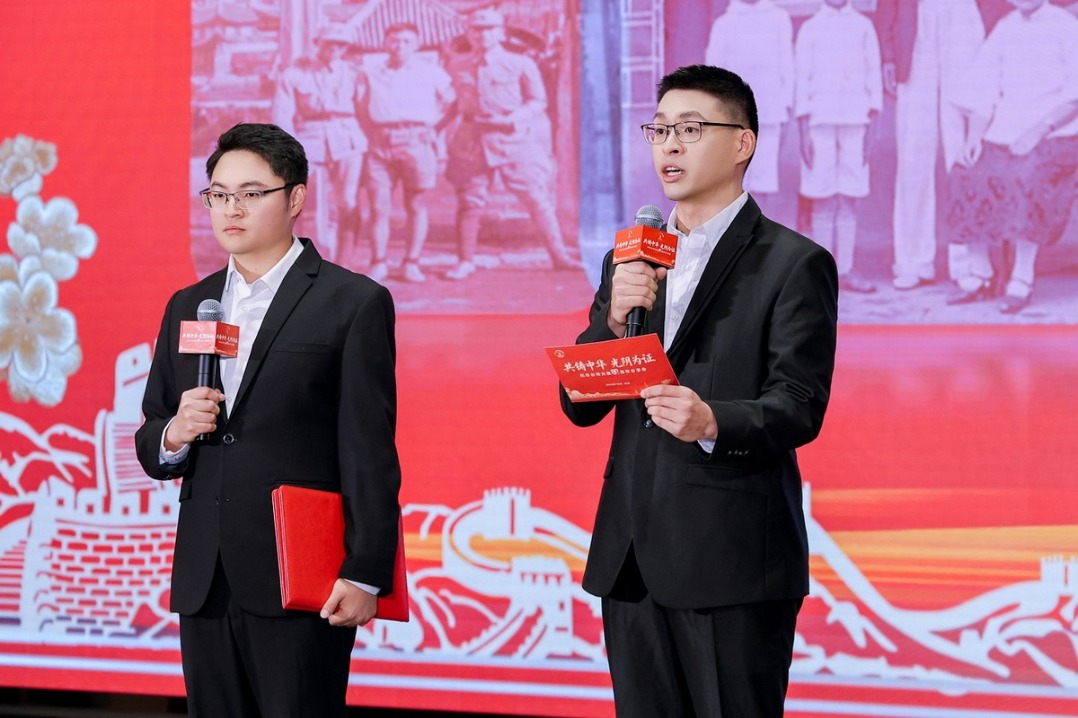Xi's philosophy of governance widely hailed
Intl observers laud long-term planning, people-centered development of China





When Penildon Silva Filho, vice-president of Brazil's Federal University of Bahia, set foot in China for the fifth time, the crisp autumn breeze in Beijing felt warmly familiar.
Six years ago, during his first academic exchange at Renmin University of China, the country's vitality left a lasting impression on him. Since then, he has developed the habit of taking home Chinese books after each visit to better understand the country.
Among those books, Filho said, one title stands out as "deeply inspiring" — Xi Jinping: The Governance of China.
"I got to know the book from my first trip to Beijing," he said.
"It offers profound insights into China's development philosophy," said Filho, who concluded his fifth trip to China last week.
The first volume of Xi Jinping: The Governance of China was published in 2014, and the series has since expanded to five volumes, published in 43 languages and distributed in more than 180 countries and regions worldwide.
Filho noted that several Brazilian parties and organizations have the Portuguese edition. "We believe President Xi Jinping's leadership is crucial not only for China but also for the world. The current Brazilian government is very inspired by his vision," he said.
Filho praised China's capacity for long-term planning — a defining feature of its governance model — and emphasized that a strong nation must plan decades ahead, not merely for the next few years.
Since 1953, China has implemented 14 five-year plans, taking a historic leap in economic and social development. The draft proposals of the 15th Five-Year Plan (2026-30), which are being discussed at the ongoing fourth plenary session of the 20th Communist Party of China Central Committee, are expected to further advance the country's modernization drive.
What impressed Filho most is China's "people-centered" development philosophy. He noted that President Xi's vision goes beyond economic growth to ensure people's "comfort and prosperity". In many countries, governments chase GDP figures while overlooking public well-being, a path that is "neither fair nor sustainable", he said.
Filho commended China's strong commitment to sustainable development and its efforts to balance economic growth with environmental protection. "Humanity is part of nature and must not act aggressively against it. If no action is taken within the next 10, 20 or 30 years, our civilization could face collapse," he said, adding that China's pursuit of energy and ecological transition is vital.
He also highlighted the strong complementarities between Brazil and China in the field of sustainable development, which have offered vast potential for cooperation.
Sergey Shakhray, former Russian deputy prime minister, shares a similar admiration for Xi's governance philosophy.
A longtime reader of Xi Jinping: The Governance of China, Shakhray said: "I closely follow President Xi's speeches. The Russian edition of Volume I was published in 2014. I have the first four volumes on my desk, and I'm eager to get the fifth, which came out in July."
He described the series as a window into China's domestic and diplomatic thinking from the perspective of its top leader. "What impressed me most is President Xi's vision of the great rejuvenation of the Chinese nation — achieved through self-reliance, not at the expense of others," he said.
For Shakhray, China's development path offers valuable lessons for other countries. "If you ask me why China has succeeded, that's a question worthy of a PhD thesis," he said with a smile. "One key reason lies in the Party's centralized leadership combined with a high degree of economic autonomy for local governments and individuals."
Shakhray said that for decades, debates have persisted over which model of democracy is superior. "Yet facts speak louder than words."
Noting that when New China was founded in 1949, it was among the poorest countries in the world, while by the end of 2020, China had completely eradicated absolute poverty, Shakhray described the achievement as the most convincing answer to the democracy debate. "It proved that governance effectiveness matters more than ideological labels," he said.
He added that China's digital transformation and advances in artificial intelligence — exemplified by applications like DeepSeek — further demonstrate the vitality and creativity of Chinese modernization.
Yuri Tavrovsky, head of the Expert Council of the Russian-Chinese Committee for Friendship, Peace and Development, described Xi's leadership as "the hallmark of a new era".
"President Xi is not only a thinker and philosopher, but also a man of action — he practices what he says," Tavrovsky said.
He said he was impressed by Xi's vision of the Chinese Dream — the great rejuvenation of the Chinese nation — and noted that China has laid out a long-term development blueprint extending to the middle of this century.
"It is the only national plan in the world that looks so far into the future, and it is being implemented step by step," Tavrovsky said.
He praised Xi's global initiatives as China's most valuable "intellectual contribution" to the world. "Concepts such as building a community with a shared future for humanity serve as a lighthouse, guiding countries through a turbulent international landscape."
Tavrovsky noted that the Global Governance Initiative proposed by Xi is particularly timely amid widening global governance deficits. "Western countries often speak of a 'rules-based international order', but those so-called rules tend to shift with their interests. President Xi isn't seeking to replace the existing system, but to make it fairer and more equitable — one grounded in the principles of the United Nations Charter," he said.
Sohail Mahmood, director-general of the Institute of Strategic Studies Islamabad, Pakistan, said China is increasingly becoming a key force for global peace and security, actively contributing to the resolution of international challenges.
He said the Belt and Road Initiative has enhanced land and maritime connectivity, serving as a landmark platform for cooperation and shared development, while Xi's four major global initiatives are "global public goods that contribute to a fairer and more equitable world order".
"These initiatives offer a vision — one of a peaceful, stable and cooperative world rooted in traditional Chinese wisdom," Mahmood said. "They have been and will continue to be welcomed by the vast majority of countries, particularly in the Global South. Pakistan fully supports all of them."
Phinij Jarusombat, head of the Thai-Chinese Cultural Relationship Council, said: "President Xi Jinping's governance and administrative thoughts are visionary and have made significant contributions to the development of human society. The Chinese people are fortunate to have a great nation and leader."
Abdulaziz Alshaabani, a researcher at the Al Riyadh Center for Political and Strategic Studies in Saudi Arabia, said that China's leadership has a clearer understanding of the historical nature of its own development path — one that balances long-term vision with pragmatic implementation.
China's governance "unites social thinking around the common goal of national rejuvenation, forming a future-oriented spiritual consensus — which can be termed 'harmonious modernization'," he said.
Contact the writers at zhaojia@chinadaily.com.cn

































